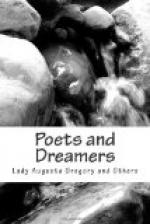’O Patrick Sarsfield,
health be to you, since you went to France
and your camps were
loosened; making your sighs along with the
king, and you left poor
Ireland and the Gael defeated—Och ochone!
’O Patrick Sarsfield, it is a man with God you are; and blessed is the earth you ever walked on. The blessing of the bright sun and the moon upon you, since you took the day from the hands of King William—Och ochone!
’O Patrick Sarsfield, the prayer of every person with you; my own prayer and the prayer of the Son of Mary with you, since you took the narrow ford going through Biorra, and since at Cuilenn O’Cuanac you won Limerick—Och ochone!
’I will go up
on the mountain alone; and I will come hither from
it
again. It is there
I saw the camp of the Gael, the poor troop
thinned, not keeping
with one another—Och ochone!
’My five hundred healths to you, halls of Limerick, and to the beautiful troop was in our company; it is bonfires we used to have and playing cards, and the word of God was often with us—Och ochone!
’There were many
soldiers glad and happy that were going the way
through seven weeks;
but now they are stretched down in
Aughrim—Och
ochone!
’They put the first breaking on us at the Bridge of the Boyne; the second breaking on the Bridge of Slaney; the third breaking in Aughrim of O’Kelly; and O sweet Ireland, my five hundred healths to you—Och ochone!
’O’Kelly
has manuring for his land, that is not sand or dung,
but
ready soldiers doing
bravery with pikes, that were left in Aughrim
stretched in ridges—Och
ochone!
’Who is that beyond
on the hill, Beinn Edair? I a poor soldier with
King James. I was
last year in arms and in dress, but this year I
am asking alms—Och
ochone!’
There are other symbolic songs besides the ‘Visions.’ Mangan’s fine translation of Kathleen ni Houlihan is well known; and it is likely the king is calling to Ireland in ‘Ceann dubh deelish,’ that is beautiful in all translations. This is An Craoibhin’s:—
’The women of the village
are in madness and trouble,
Pulling their
hair and letting it go with the wind;
They will not take a boy of
the men of the country
Till they go into
the rout with the boys of the king.
’Black head, darling,
darling, darling,
Black head, darling,
move over to me;
Black head brighter than swan
and than seagull,
It’s a man
without heart gives not love to thee.’
But most of the translations have been in the affected style of the early part of the last century twisting the sense to give what was thought to be a romantic turn. A verse of Seaghan Clarach’s, for instance, the lament of a farmer ’who has been wrestling with the world’: ’The two that belong to me are without shelter, and my yoke of cattle without grass, without growth; there is misery on my people and their elbows without sound clothes,’ is turned into:—




